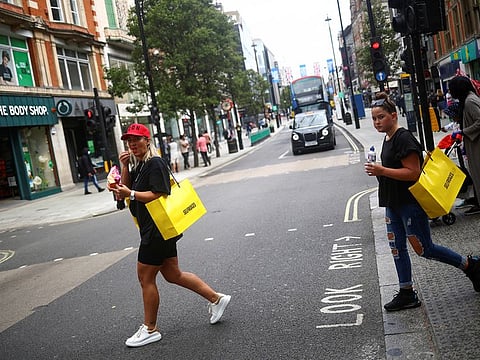UK's budget deficit is heading into largest peace-time levels ever
Third quarter growth uptick subsides, leaving economy in record deficit territory

London: UK government borrowing climbed to a record 240.9 billion pounds ($323 billion) in the first eight months of the fiscal year, reflecting the damage inflicted on an economy now at risk of falling back into recession.
In November, spending exceeded tax revenue by 31.6 billion pounds amid the escalating cost of supporting firms and households through the pandemic, Office for National Statistics figures published Tuesday show. It leaves Britain facing its largest ever peacetime budget deficit.
Separate figures confirmed the economy rebounded strongly in the third quarter. But a contraction is expected this quarter, and hopes of recovery early next year are fading after the government tightened restrictions to combat a mutated coronavirus and several European countries banned entry from Britain.
Meanwhile, deadlocked talks over a Brexit trade deal are heading toward a December 31 cliff edge.
Keep adding
The multiple threats pile pressure on Chancellor of the Exchequer Rishi Sunak and Bank of England policymakers to step up fiscal and monetary support, with some analysts now predicting the economy will shrink in the first quarter too.The potential hit means that the budget deficit in the fiscal year as a whole could be larger than the 394 billion pounds - 19 per cent of GDP - predicted by the Office for Budget Responsibility last month.
That's already the biggest among major industrial nations.A worse-case virus scenario combined with a no-deal Brexit could see borrowing soar to almost 450 billion pounds in 2020-21, with debt topping 125 per cent of GDP in the following year, the fiscal watchdog warned.
Only way
The high level of spending, "is the right thing to do to protect lives and livelihoods during this acute phase of the crisis," Sunak said in a statement. "When our economy recovers, it's right that we take the necessary steps to put the public finances on a more sustainable footing so we are able to respond to future crises in the way we have done this year."
Sunak has signaled that tax increases are coming eventually, but he is under no immediate pressure as the Bank of England's vast bond-buying programme is keeping the cost of borrowing close to record lows. In the short term, further fiscal stimulus appears more likely despite the rollout-out of a vaccine programme, with the chancellor last week announcing that wage support for furloughed workers is being extended by a month to the end of April.
The economy grew 16 per cemt in the third quarter, slightly more than previously estimated, recovering from a second quarter when the economy was placed under a near-total lockdown. Restrictions were re-imposed this quarter, and GDP is on course to contract by around 11 per cent in 2020, the most since the Great Frost of 1709.
Call in reserves
Britons saved less of the incomes in the third quarter as non-essential stories reopened, with the ratio falling to 16.9 per cent from an unprecedented 27.4 per cent in the previous three months. Households have amassed large unspent savings this year, which could help support the economy next year.
Government support underpinned real household incomes, which rose 4.9 per cent. Separate figures showed the current-account deficit widened to 15.7 billion pounds, or 2.9 per cent of GDP, from the second quarter.
The increase was driven by a smaller trade surplus. The deficit in investment income narrowed sharply.
Sign up for the Daily Briefing
Get the latest news and updates straight to your inbox







